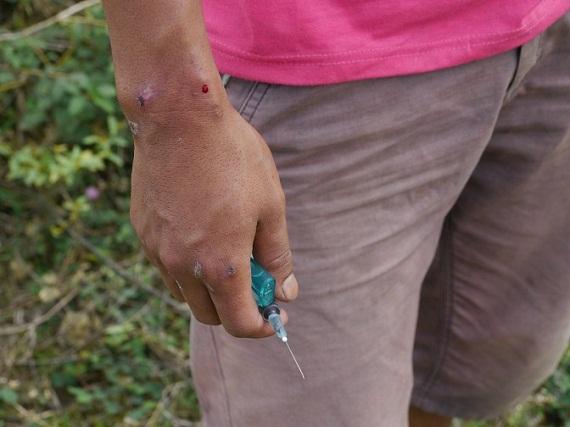HEADLINE
Indonesia’s ill-targeted war on drugs
"It’s not the only reason Indonesia’s fight against narcotics appears to be missing the mark… "
Asia Taylor

Indonesia’s war on drugs took a bizarre turn late last year when head of the National Narcotics Board, Budi Waseso, said crocodiles would solve the country’s drug problem.
Waseso announced plans for an island prison that would be guarded by the deadly reptiles – together with tigers and piranhas.
It’s not the only reason Indonesia’s fight against narcotics appears to be missing the mark…
From the capital Jakarta, Asia Taylor has more.
When he first came into office, Indonesian president Joko Widodo claimed the country was facing a ‘drug emergency’, one that was killing 50 people a day.
With some of the strictest drug laws in the world, the new administration has been quick to enforce them – in March last year executing eight convicted drug traffickers by firing squad.
Suhendro Suihato is from the Indonesia Drug Users Network, or the PKNI.
He says the government’s hard-line stance against drugs is deeply problematic for users – and ultimately in vain.
Like ‘playing chess with a monkey,’ no one is going to win.
“There are many human rights violations towards people who use drugs; harassment, violence, stigma, discrimination, imprisonment, being expelled from school, losing your job just because you’re drug user,” he says.
Indonesian law – which fails to clearly distinguish between users and dealers – sees many drug users end up in prison rather than rehab.
As of May last year, 36 percent of all inmates at Indonesia’s overcrowded jails were serving time for drugs.
The problem is that given rampant corruption, users can still get their hands on drugs on the inside.
Professor Irwanto, from Atma Jaya University in Jakarta, has been studying this issue for more than three decades and says that users should be treated, not punished.
“Why does the law has to punish them? They’re the victims of the industry, we should save them not punish them,” he says, “I mean the world is flip flop because some crazy guy likes to be the hero of this war against drugs and they forget who they’re dealing with. They have to deal with the producers who may not use drugs.”
In Indonesia it is also a crime for parents to fail to report their drug-dependent children. If caught, they could be sentenced to six months in jail.
PKNI media and communications officer, Edo Andries, a drug user himself, says the whole approach and public mindset has to change.
“Public opinion is so bad about drug using so we want to change it that we are the victim of the system,” argues Andries.
Current laws also lead addicts to make risky decisions – like sharing needles because they are too scared to go to a clean needle exchange where they might get arrested for drug use.
Professor Irwanto says that rather than combating drug usage, the government’s approach is fuelling a future health crisis.
“This criminalizing policing strategy actually ruined the building blocks that have been built for harm eradication,” he says, “so actually I will not be surprised if in the next 5-10 years we see HIV aids on the rise again within the population of injecting drug users.”
Globally, the rate of HIV has been falling, but in Indonesia it is the opposite scenario.
According to the National Aids Commission, 54 percent of intravenous drug users have HIV in Indonesia – largely from sharing needles.
To Irwanto, this is evidence the government’s approach is not helping to solve the problem – and nor are bizarre ideas such as Waseso’s crocodile plan.
“This strategy is like a national sport. People get high with the type of action they take to fight drugs,” he says, “This is a problem in itself because people do feel like playing a hero get a kick out of it even though it is not effective. People do not want to quit just like having drugs actually because by doing this its like being a junky too.”
There are currently more than 400 rehabilitation facilities across the country, but most lack proper treatment, training and staff.
Still, Dr. Nadia Alwaini, from the National Narcotics Board in Jakarta, says the government has recently decided to implement forced rehabilitation.
“The relapse number is always big, but we should always try to give them rehab to give them therapy,” she says, “I think its better for them to go to rehab better then them living outside in their neighborhood because if they go to rehab at least they try.”
While most drug users are still being sent to prison, critics say an emphasis on rehab rather than jail is a more clear-eyed solution.
- eng
- Asia Taylor
- Indonesia war on drugs
Komentar (0)
KBR percaya pembaca situs ini adalah orang-orang yang cerdas dan terpelajar. Karena itu mari kita gunakan kata-kata yang santun di dalam kolom komentar ini. Kalimat yang sopan, menjauhi prasangka SARA (suku, agama, ras dan antargolongan), pasti akan lebih didengar. Yuk, kita praktikkan!